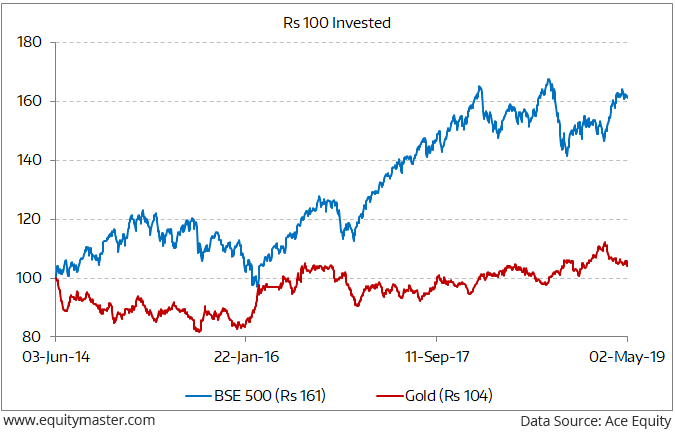India's Third Giant Leap
This Could be One of the Biggest Opportunities for Investors
- Home
- Todays Market
- Indian Stock Market News August 5, 2019
Sensex Opens Lower Tracking Weak Global Cues; Yes Bank & Vedanta Top Losers Mon, 5 Aug 09:30 am
Asian share markets are lower today as Chinese and Hong Kong shares fall. The Shanghai Composite is off 0.6% while the Hang Seng is down 2.8%. The Nikkei 225 is trading down by 2.4%. Wall Street extended its sell-off on Friday on renewed trade fears as the benchmark S&P 500 index and Nasdaq saw their worst weekly percentage plunges since December, when investors were spooked by the prospect of a looming recession. The blue-chip Dow and the S&P 500 hit their lowest levels since late June with S&P 500 and the Nasdaq registering their fifth consecutive days of losses.
Back home, India share markets plunged in the opening session amid weak cues. The BSE Sensex is trading down by 462 points while the NSE Nifty is trading down by 130 points. Both, the BSE Mid Cap index and BSE Small Cap index opened down by 1.2%.
Barring IT stocks, all sectoral indices have opened the day on a negative note with metal stocks and oil & gas stocks witnessing maximum selling pressure.
The rupee is currently trading at 70.18 against the US$.
The rupee dived 54 paise on August 2 to close at an over six-week low of 69.60 against the US dollar as soaring crude oil prices and a fresh flare up in US-China trade tensions weighed on emerging market currencies.
Global markets tumbled and safe-haven assets like the Japanese yen gained after President Donald Trump on Thursday announced that the US will impose an additional 10% tariff on US$ 300 billion worth Chinese imports, which Beijing vowed to retaliate.
In a series of tweets, Trump said the new tariff, in addition to the 25% on goods worth US$ 250 billion that was previously in place, would come into effect from September 1.
Persistent foreign fund outflows and a strengthening greenback also put pressure on the domestic currency, forex traders said.
At the interbank foreign exchange (forex) market, the rupee opened at 69.26 a dollar, then lost further ground and touched a low of 69.67 during the session.
Speaking of currencies, Vijay Bhambwani, editor of Weekly Cash Alerts, tells you the main reasons why not to trade commodities and currencies the same way you would trade equities. Here's an excerpt of what he wrote...
- Currencies are traded in pairs and the most liquid is the USDINR. Currencies are traded in four decimal points just as bonds are. The international derivative trader's association has indicated that forex may be traded in 6 decimals in the coming few years.
It takes months sometimes for the currency pair to pass the next round figure, say from 70 to 71.
Can you really trade commodities and currencies alike or for that matter, equities and currencies alike? Definitely not!
To know more, you can read Vijay's entire article here: Is Trading in Equities, Commodities, and Currencies the Same?
Moving on to the news from the economy. India's foreign exchange reserves decreased by US$727.1 million during the week ended July 26.
According to the Reserve Bank of India's weekly statistical supplement, the overall forex reserves declined to US$429.6 billion from US$430.4 billion reported for the week ended July 12.
India's forex reserves comprise Foreign Currency Assets (FCAs), gold reserves, Special Drawing Rights (SDRs) and India's reserve position with the International Monetary Fund (IMF).
On a weekly basis, FCAs - the largest component of the forex reserves - edged lower by US$1.7 billion to US$399.4 billion.
Besides the US dollar, FCAs consist of 20-30% of the other major global currencies.
The SDR value slipped by US$2.8 million to US$1.4 billion, whereas the country's reserve position with the IMF declined by US$15.8 million to US$3.5 billion.
However, the RBI's weekly data showed that the value of the country's gold reserves went up by US$1 billion to US$25.3 billion.
Speaking of stock markets and gold, gold has always been a staple investment for Indian households.
There are various opinions on what proportion of the portfolio could be allocated to the yellow metal.
Stocks versus Gold Over Past 5 Years
Here's what co-head of research at Equitymaster, Tanushree Banerjee wrote in one of the edition of The 5 Minute WrapUp:
- "The magical metal will be no match for the Indian mettle over the next decade.
So, by all means buy some gold for inflation hedge.
But don't lose sight of the Rebirth of India opportunity."
Also, watch Vijay Bhambwani talk about investing opportunities in gold.
To know what's moving the Indian stock markets today, check out the most recent share market updates here.
For information on how to pick stocks that have the potential to deliver big returns, download our special report now!
Read the latest Market Commentary



Equitymaster requests your view! Post a comment on "Sensex Opens Lower Tracking Weak Global Cues; Yes Bank & Vedanta Top Losers". Click here!
Comments are moderated by Equitymaster, in accordance with the Terms of Use, and may not appear
on this article until they have been reviewed and deemed appropriate for posting.
In the meantime, you may want to share this article with your friends!